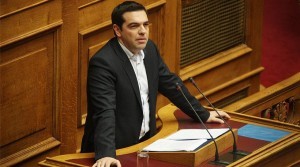PM Alexis Tsipras briefed Parliament on Friday afternoon over his government’s still unsuccessful talks with international creditors.
Tsipras took his case lawmakers via a nationally televised address from Parliament’s podium, as political developments suddenly — and ominously — moved in a negative direction for his embattled leftist government.
He spoke on the same day that an IMF installment of 300 million was due for repayment; instead it was “bundled” with other June payments. His comments from Parliament’s podium were aimed, variously, at different audiences: creditors, particularly in the eurozone; his own ‘internal opposition, an increasingly skeptical public opinion, and finally, opposition MPs that mostly lie to the right of his radical leftists.
Highlights of Tsipras’ address:
— The Greek proposal was the only realistic basis for discussion
— Negotiations had entered “final stretch”, were at a “critical point”
— “we’re closer than ever to a resolution”
— He was “unpleasantly surprised” by the framework proposal he was handed by EU Commission President Jean-Claude Juncker and stressed that the Greek government
— His government “cannot agree to unreasonable proposals”
Greece wants an “European solution”
He called on the opposition to clarify whether it was for or against the “Juncker proposal”
He said he government wants a proposal that includes:
Low primary surpluses
Reduction/restructuring of the debt
Protection for wages and pensions
Restoration of sector-wide collective bargaining talks
Earlier, Radical Left Coalition (SYRIZA) government nudged a step closer to a eurozone exit by stating that Greece would not be making a debt repayment worth 300-million euros to the International Monetary Fund (IMF) on Friday. Instead, it plans to bundle June installments – worth a total of 1.5 billion euros with payments due on June 5, 12 and 19.
The decision was not totally surprising considering the cash-strapped government’s pledge to pay pensions and public sector wages before the IMF installment, but it was a contradiction following assurances earlier in the week that Greece would make the payment.
There is a feeling in the government that the creditors, rather than propose a compromise solution, are depending on Greek desperation to impose extreme measures that would allow for Greece’s short-term recovery but lead to a long-term humanitarian disaster. A press release on Thursday said that the proposals submitted by the country’s lenders would deepen poverty and unemployment. “After four months of negotiations, the institutions submitted proposals whose implementation would not resolve the riddle of the economic crisis which was exacerbated by the policies of the last five years,” said the statement.
The creditors’ five-page ultimatum presented by European Commission President Jean-Claude Juncker on Thursday was viewed as shocking and dishonorable. A number of SYRIZA ministers expressed outrage.
The IMF issued a short statement confirming Greece’s plans to bundle payments. IMF Spokesman Gerry Rice said: “Under an executive board decision adopted in the late 1970s, country members can ask to bundle together multiple principal payments falling due in a calendar month (payments of interest cannot be included in the bundle). The decision was intended to address the administrative difficulty of making multiple payments in a short period.”
Ask me anything
Explore related questions





